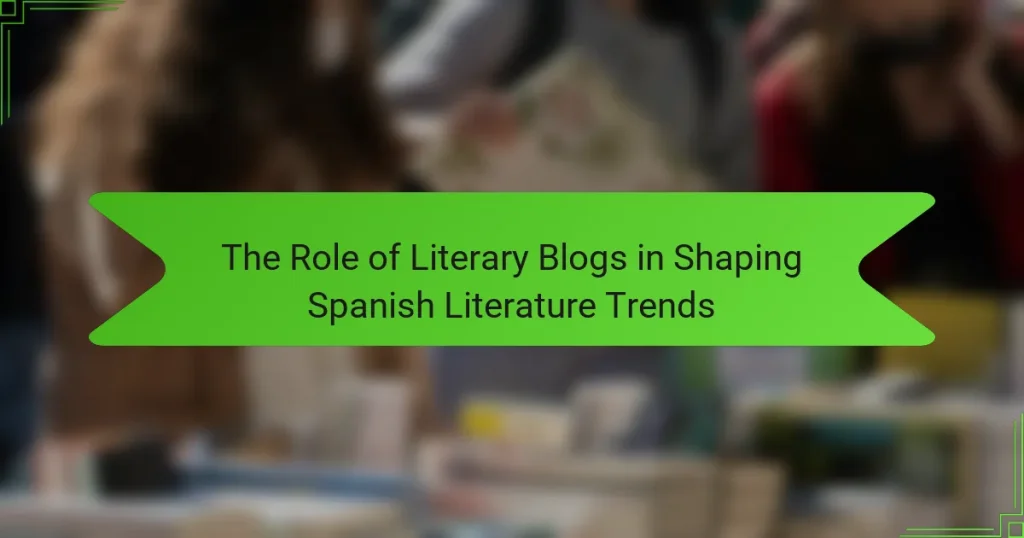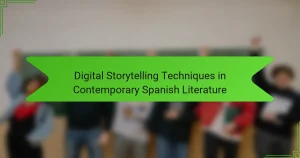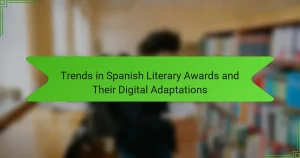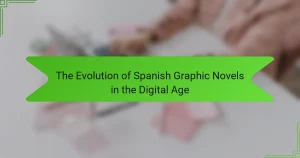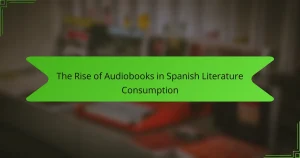Literary blogs play a crucial role in shaping trends in Spanish literature by promoting emerging voices and facilitating critical discussions. They highlight underrepresented genres and enhance visibility for new authors. Popular platforms like WordPress and Medium foster community engagement, while social media amplifies literary conversations. Additionally, blogs reflect cultural themes and influence reader preferences, making literature more accessible and relevant.
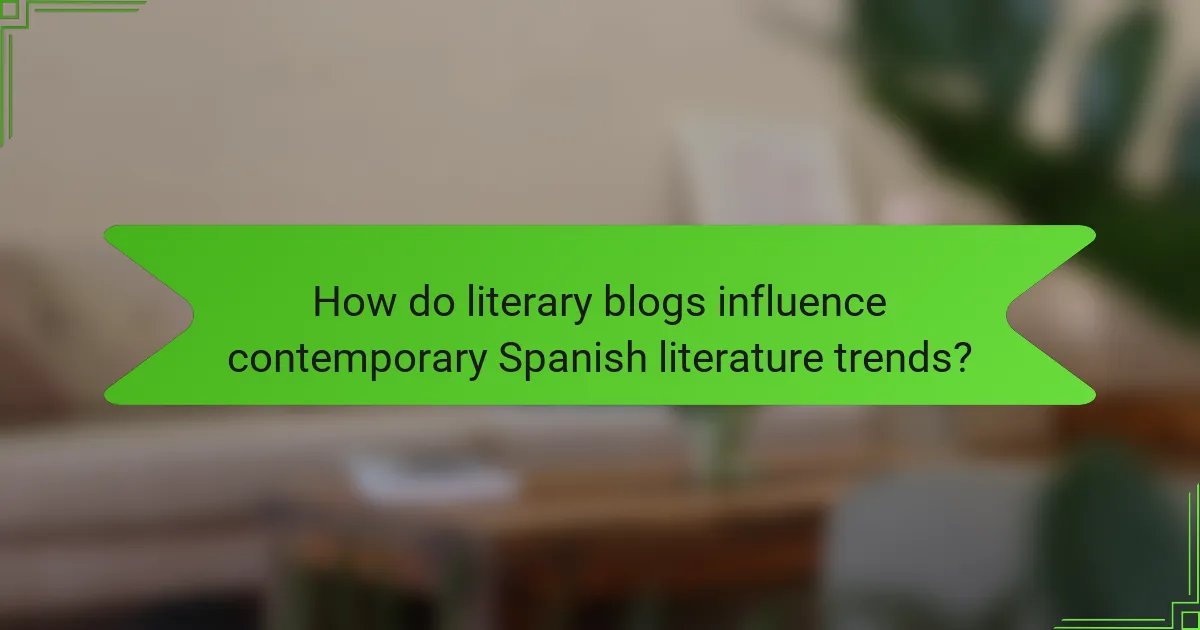
How do literary blogs influence contemporary Spanish literature trends?
Literary blogs significantly influence contemporary Spanish literature trends by providing platforms for emerging voices and diverse perspectives. They facilitate discussions, promote new authors, and critique established works. As a result, these blogs shape reader preferences and foster community engagement. The immediacy of online content allows for rapid dissemination of ideas, making literary trends more accessible. Additionally, literary blogs often highlight underrepresented genres, enriching the literary landscape in Spain.
What role do bloggers play in promoting Spanish authors?
Bloggers significantly influence the promotion of Spanish authors by providing visibility and engagement. They create platforms for discussions, reviews, and recommendations, which amplify the reach of literary works. By highlighting emerging voices and trends, bloggers help shape public perception and interest in Spanish literature. Their unique insights and personal connections to the literature foster a community that encourages readers to explore diverse narratives. This role is crucial in a digital landscape where traditional media may overlook these authors.
How do literary discussions on blogs shape reader perceptions?
Literary discussions on blogs significantly influence reader perceptions of Spanish literature trends. These platforms provide insights, critiques, and diverse viewpoints that shape how audiences engage with literary works.
Readers often rely on blogs for recommendations, which can elevate lesser-known authors and genres. This exposure fosters a broader appreciation for Spanish literature, encouraging exploration beyond mainstream narratives. Furthermore, the interactive nature of blogs allows for community dialogue, enhancing reader understanding and connection to the literature.
As a result, literary blogs serve as a vital bridge between authors and readers, impacting literary trends through shared experiences and collective discourse. This dynamic shapes the evolving landscape of Spanish literature, reflecting contemporary societal themes and reader interests.
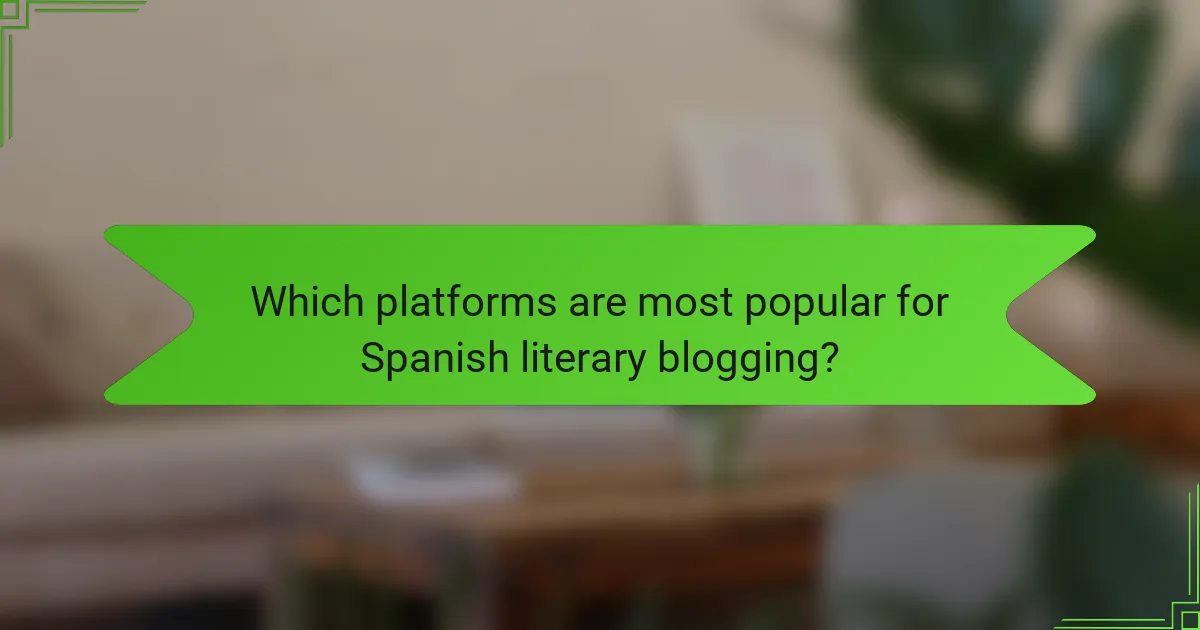
Which platforms are most popular for Spanish literary blogging?
The most popular platforms for Spanish literary blogging include WordPress, Blogger, and Medium. These platforms offer diverse features that cater to writers and readers alike. WordPress is favoured for its customization options and community engagement. Blogger provides an easy setup for beginners, while Medium emphasizes quality content and reader interaction. Social media platforms like Instagram and Twitter also play a significant role in promoting literary discussions and connecting bloggers with their audience.
What are the unique features of Spanish literary blogs compared to other regions?
Spanish literary blogs uniquely emphasize cultural context, regional dialects, and diverse literary movements. They often showcase emerging authors and provide in-depth critiques that reflect local societal issues. Unlike blogs from other regions, they foster community engagement through interactive discussions and local events. This distinct focus on Spanish heritage and contemporary relevance shapes literature trends significantly.
How do different blogging platforms affect content dissemination?
Different blogging platforms significantly influence how literary blogs shape trends in Spanish literature. Platforms like WordPress and Medium offer diverse features that enhance visibility and engagement.
For instance, WordPress allows for extensive customization and SEO optimization, which can attract a broader audience. Medium, known for its built-in readership, fosters community interaction and sharing, enhancing the dissemination of literary content.
The choice of platform affects content reach and audience engagement, ultimately impacting the evolution of literary trends. Blogs hosted on more interactive platforms often generate discussions that can lead to new literary movements or the revival of interest in traditional works.
In summary, the platform selected can either amplify or limit a blog’s influence on Spanish literature trends, highlighting the importance of strategic choices in content dissemination.
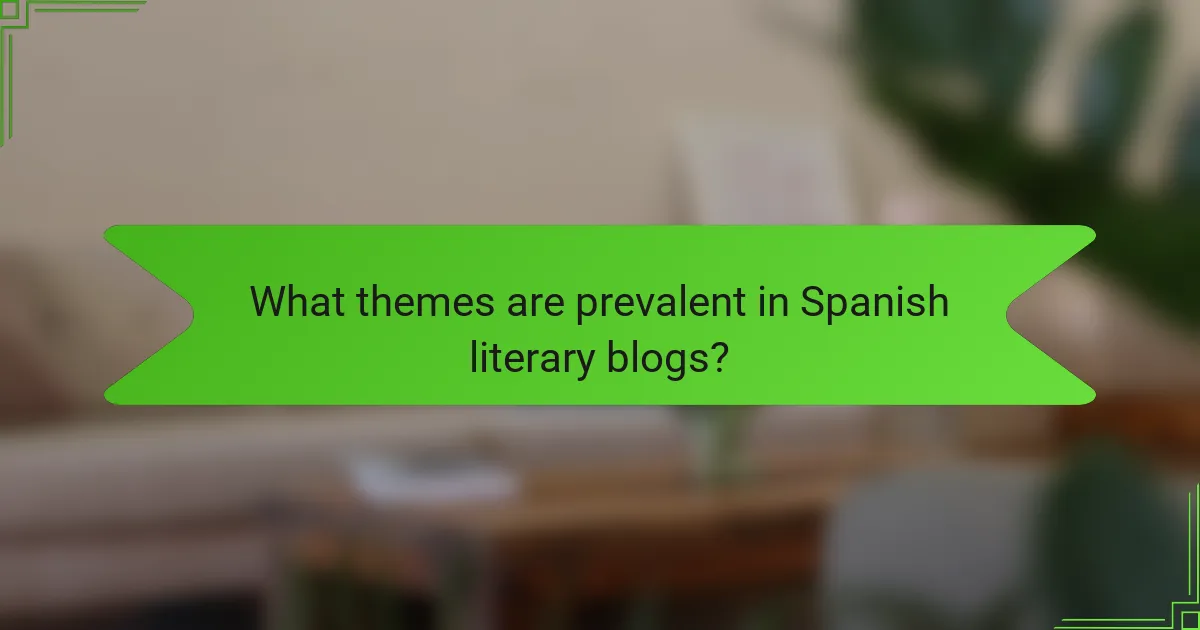
What themes are prevalent in Spanish literary blogs?
Literary blogs significantly influence trends in Spanish literature by highlighting emerging voices and genres. They foster community discussions, promote lesser-known authors, and provide critical reviews. This engagement shapes readers’ preferences and impacts publishing trends. Additionally, blogs often reflect cultural and societal themes, making literature more accessible and relevant. The unique attribute of these blogs is their ability to connect diverse audiences through shared literary interests.
How do cultural and social issues influence blog content?
Cultural and social issues significantly shape blog content by influencing themes, perspectives, and audience engagement. Literary blogs reflect societal values, trends, and debates within Spanish literature, showcasing diverse voices and narratives. For instance, blogs often highlight contemporary social issues such as immigration, identity, and gender, which resonate with readers. This engagement fosters a dynamic literary landscape, encouraging authors to explore relevant topics. As a result, literary blogs act as platforms for cultural discourse, impacting the evolution of Spanish literature trends.
Which genres receive the most attention from literary bloggers?
Literary bloggers focus on genres such as contemporary fiction, historical fiction, and fantasy. These genres dominate attention due to their popularity and reader engagement. Contemporary fiction often reflects current societal issues, while historical fiction offers immersive experiences in past eras. Fantasy captivates readers with imaginative worlds and complex narratives.
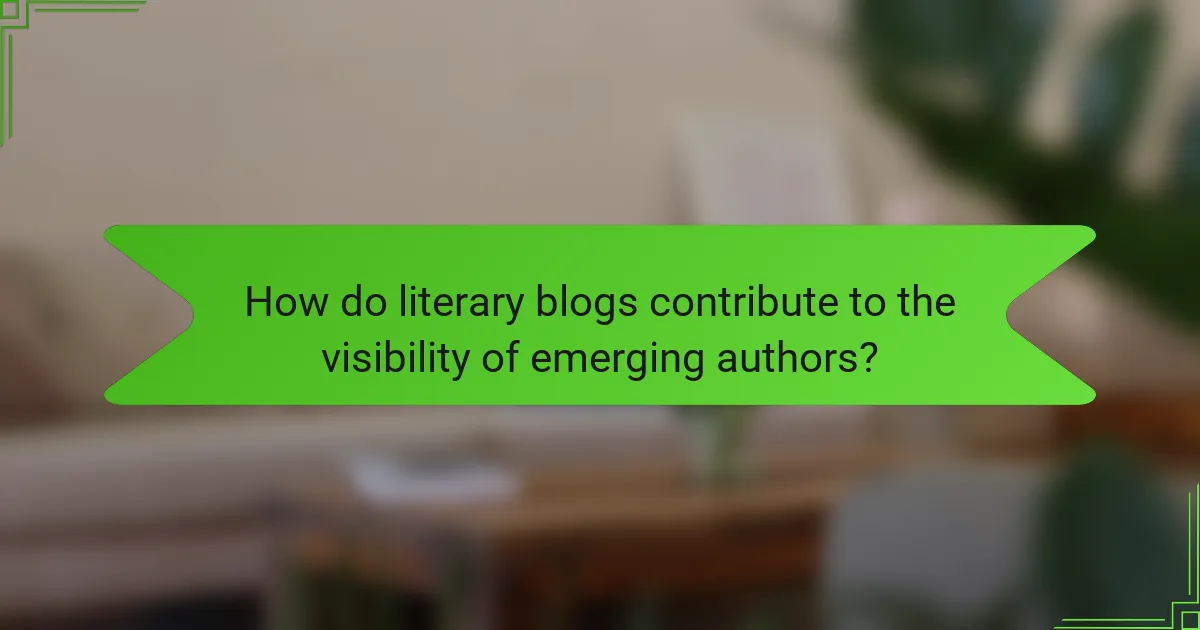
How do literary blogs contribute to the visibility of emerging authors?
Literary blogs significantly enhance the visibility of emerging authors by providing platforms for exposure and engagement. They create communities around specific genres, allowing new voices to reach wider audiences. Blogs often feature author interviews, reviews, and discussions that spotlight fresh talent, making it easier for readers to discover these writers. Additionally, literary blogs can influence trends in Spanish literature, promoting innovative narratives and diverse perspectives. This dynamic interaction fosters a supportive ecosystem that nurtures both authors and readers.
What strategies do bloggers use to promote new voices in literature?
Literary blogs promote new voices in Spanish literature through targeted strategies that enhance visibility and engagement. They often feature author interviews, book reviews, and curated lists of emerging writers, creating a platform for diverse perspectives.
Additionally, bloggers utilize social media to amplify their reach, connecting with readers and fostering discussions around new works. Collaborations with literary festivals and online events further support the promotion of these voices.
By engaging with audiences through interactive content, bloggers cultivate a community that values fresh literary contributions, ultimately shaping trends in Spanish literature.
How does reader engagement impact the success of new authors?
Reader engagement significantly influences the success of new authors by fostering community and increasing visibility. Literary blogs play a crucial role in shaping trends within Spanish literature, offering platforms for emerging voices. These blogs provide critical reviews and discussions that can enhance reader interest and promote new works. As a result, authors gain valuable feedback and exposure, which can lead to higher sales and wider recognition. Engaged readers often share content, amplifying an author’s reach and establishing a loyal following.
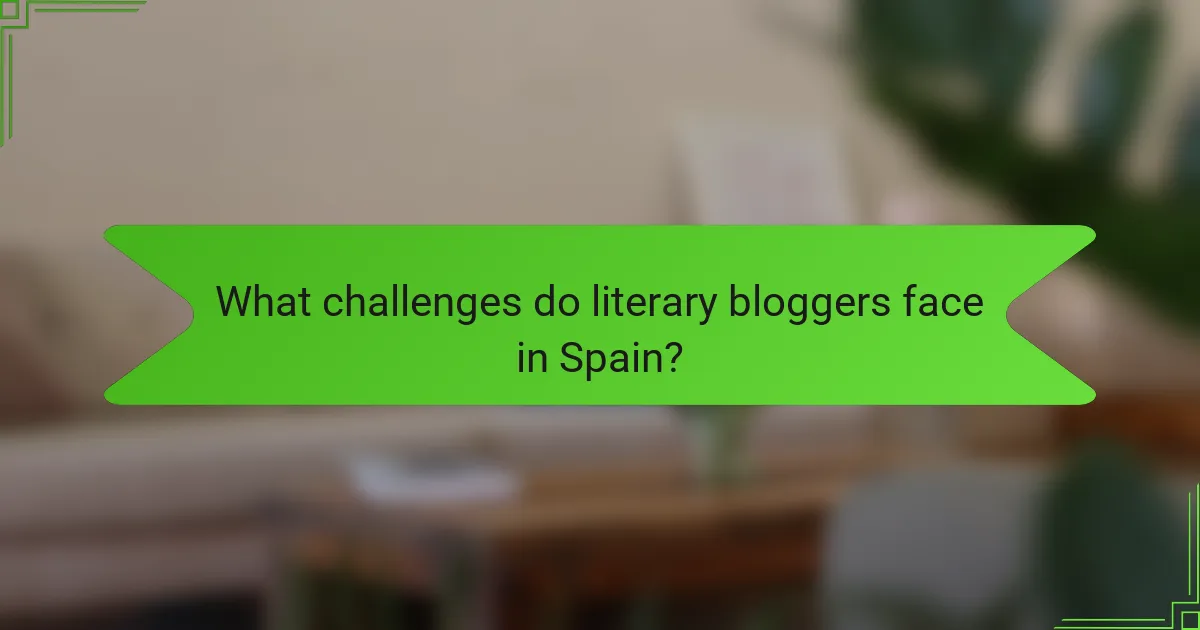
What challenges do literary bloggers face in Spain?
Literary bloggers in Spain face several challenges that impact their influence on literature trends. Limited financial resources hinder professional development and networking opportunities. The saturation of online content makes it difficult for new voices to gain visibility. Additionally, many bloggers struggle with balancing personal expression and commercial viability, often leading to conflicts in their content strategies. The evolving landscape of social media also demands constant adaptation, which can be overwhelming for some. Finally, navigating copyright issues and maintaining originality poses significant hurdles in a competitive environment.
How do economic factors affect blogging practices?
Economic factors significantly influence blogging practices by shaping content creation, audience engagement, and monetization strategies. For instance, economic downturns may lead bloggers to focus on budget-friendly topics, while prosperous times can encourage luxury or lifestyle content. Additionally, advertising budgets fluctuate with the economy, affecting potential revenue for bloggers. As a result, the economic climate directly impacts which literary trends gain traction in Spanish literature through blogs.
What are the common issues related to content monetization?
Literary blogs face several common issues in content monetization. These include attracting a consistent readership, generating ad revenue, and securing sponsorships. Additionally, maintaining engagement through quality content is crucial for monetization success. Blogs often struggle with balancing personal expression and commercial viability, which can hinder their financial sustainability.
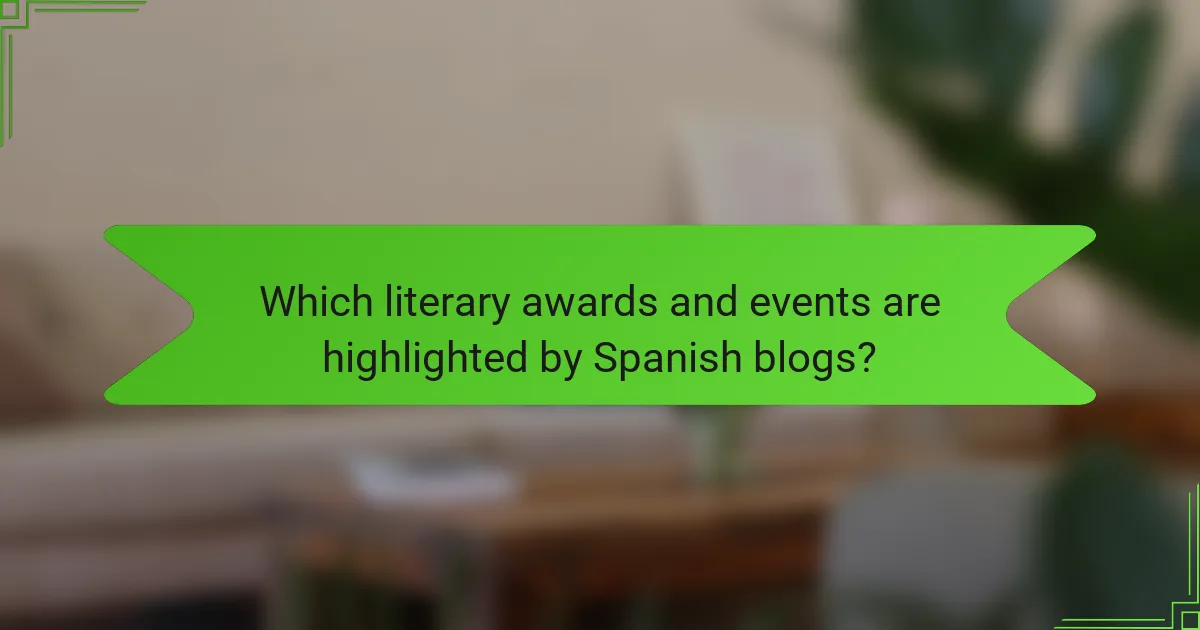
Which literary awards and events are highlighted by Spanish blogs?
Spanish blogs highlight several literary awards and events that significantly influence literature trends. Prominent among these are the Premio Planeta, Premio Nadal, and the Feria del Libro de Madrid.
The Premio Planeta is one of the most prestigious literary awards, recognizing outstanding Spanish-language novels. The Premio Nadal, awarded annually, emphasizes new authors and innovative works. The Feria del Libro de Madrid serves as a vital event for literary exchange, showcasing emerging talents and established writers.
These awards and events reflect the evolving landscape of Spanish literature, fostering new voices and celebrating literary excellence.
How do blogs shape the narrative around literary awards?
Literary blogs significantly influence the narrative surrounding literary awards, particularly in Spanish literature. They provide platforms for discussion and critique, shaping public perception and highlighting emerging trends.
Blogs often spotlight authors and works that may otherwise be overlooked by mainstream media, thus broadening the scope of recognition. They create communities where readers and writers engage, fostering a deeper appreciation for diverse literary voices.
As a result, literary blogs can sway award nominations and outcomes by generating buzz around specific titles or authors. This dynamic can lead to increased visibility and sales, demonstrating the blogs’ power in the literary ecosystem.
Ultimately, the role of literary blogs in shaping narratives around awards is crucial, as they bridge the gap between creators and audiences, influencing tastes and trends in Spanish literature.
What impact do literary events have on blog content?
Literary events significantly influence blog content by fostering discussions and trends in Spanish literature. They serve as platforms for authors to showcase their work, which bloggers then analyze and disseminate. This interaction shapes public perception and interest in emerging literary movements. For instance, events often highlight unique voices and themes, prompting bloggers to explore these topics further. As a result, literary blogs become vital in promoting new literature and engaging readers in contemporary debates.
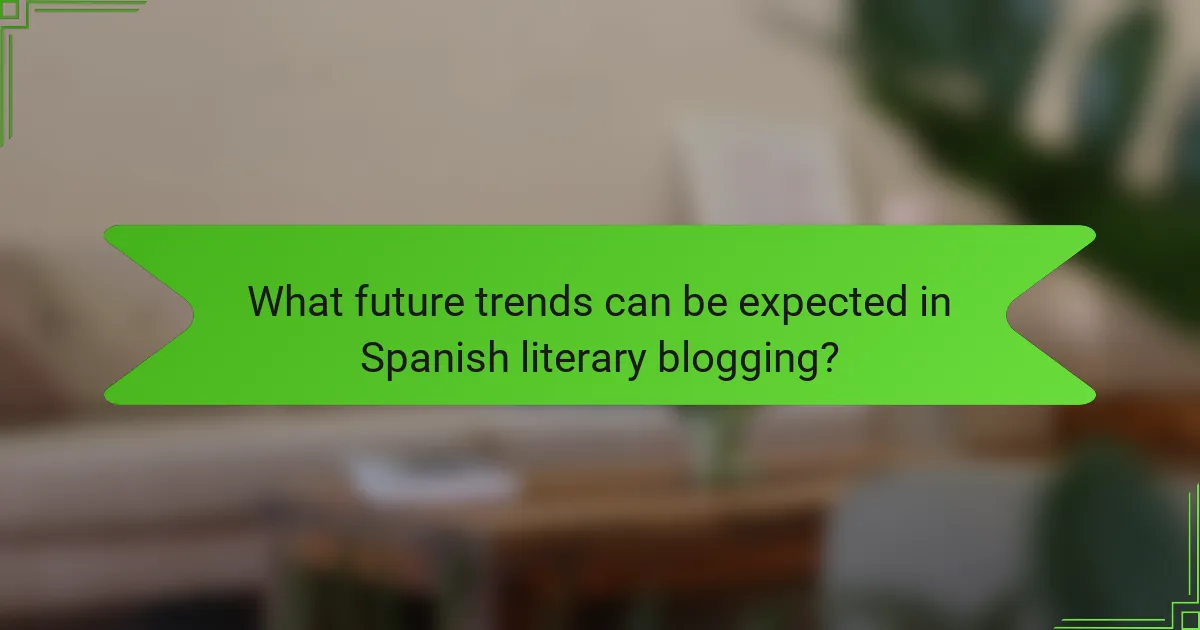
What future trends can be expected in Spanish literary blogging?
Literary blogs will increasingly influence Spanish literature trends through diverse voices and accessibility. They will foster community engagement and promote emerging authors. The integration of multimedia content will enhance reader experience, while social media will amplify blog reach. Additionally, data analytics will shape content strategies, allowing bloggers to tailor their posts to audience preferences.
How are technological advancements influencing blogging practices?
Technological advancements significantly influence blogging practices by enhancing accessibility and engagement. Literary blogs shape Spanish literature trends through online platforms that allow diverse voices to emerge. These blogs foster community discussions, provide instant feedback, and enable writers to share their work widely. As a result, emerging authors gain visibility and can influence literary trends more rapidly than traditional publishing methods. The unique attribute of literary blogs is their ability to connect readers and writers in real-time, creating a dynamic literary culture.
What role will social media play in the evolution of literary blogs?
Social media will significantly enhance the visibility and reach of literary blogs, influencing Spanish literature trends. Platforms like Twitter and Instagram allow bloggers to share insights and engage with readers instantly. This interaction fosters a community around Spanish literature, encouraging diverse voices and emerging authors. As a result, social media serves as a catalyst for new literary movements, shaping trends and discussions in real-time.
What best practices can bloggers adopt to enhance their impact?
Bloggers can enhance their impact by focusing on authenticity, engaging storytelling, and audience interaction. They should prioritize unique perspectives that resonate with readers, fostering a community around their content. Consistent posting schedules help maintain audience interest and build trust. Collaborating with other bloggers amplifies reach and introduces diverse viewpoints. Utilizing social media effectively can drive traffic and encourage discussions, further shaping trends in Spanish literature.
